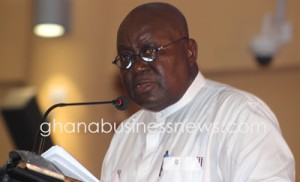Ghana missed all IMF targets for 2016 – President

In April 2015, the Ghana government signed a $918 million credit facility agreement with the International Monetary Fund (IMF), the three-year arrangement under the Extended Credit Facility (ECF) was in support of the country’s medium-term economic reform programme.
Under the programme, the IMF sought to support growth and help reduce poverty by restoring macroeconomic stability through an ambitious and sustained fiscal consolidation, a prudent debt management strategy with improved fiscal transparency, and an effective monetary policy framework.
Secondly, the programme foresaw a pick-up in economic growth, starting in 2016, supported by expected increases in hydrocarbon production. Lower inflation and interest rates, combined with a stable exchange rate environment that would help support private sector activity.
The programme also projected that increased oil exports and lower oil imports on the back of domestic gas production will support the improvement in the current account, which together with the surpluses on the financial and capital account will help build up gross reserves to a more adequate level over the medium term.
But in his first State of the Nation Address in Parliament today February 21, 2017, President Nana Akufo-Addo says the government of the National Democratic Congress (NDC) which signed the agreement, and was defeated in elections in December 2016 has missed all the targets set under the programme.
“Mr. Speaker, the promises to the Ghanaian people were, however, not kept. In fact, virtually all the targets under the IMF programme, as at December 2016, have been missed.
Fiscal indiscipline, once again, reared its head in the 2016 election year,” he said.
The president pointed out that the total projected expenditure for 2016 was GH¢43.9 billion (26 per cent of GDP), but actual expenditure amounted to GH¢50.3 billion (30.2 per cent of GDP).
“The full facts of the situation have not been put before the Ghanaian people. It appears, from what we are finding out, that some GH¢7 billion of arrears and outstanding payments circumvented the very public financial management system that was put in place to prevent such occurrences. These expenditures are being currently audited,” he said.
The President also noted that, at the same time, revenue performance for the year was poor, indicating that “the total revenue target for our country was GH¢37.9 billion (22.7 per cent of GDP), but the actual revenue came in at GH¢33.2 billion (19.9 per cent of GDP).”
He said the combination of higher expenditures and lower revenues than projected resulted in a significant increase in the budget deficit for 2016.
“As compared to a target of 5.3 per cent under the IMF programme, the fiscal deficit for 2016 was 9 per cent of GDP on a cash basis and 10.2 per cent of GDP on a commitment basis (that is on the basis of expenditures undertaken but not yet paid for). It should be recalled that, at the time Ghana entered into the IMF programme to restore fiscal discipline, the fiscal deficit was 10.2 per cent of GDP. It is very clear, therefore, that the objectives set out in the programme have not been achieved,” he said.
According to the President, the increasing fiscal deficits were financed by increased borrowing.
“As at the beginning of 2009, Ghana’s total debt stock was GH¢9.5 billion. By the end of 2016, the debt stock had ballooned to GH¢122 billion. Ghana’s debt stock now stands at 74 per cent of GDP, after all the previous denials to the contrary. More debt was accumulated by the previous government in the last eight years than all other governments put together since independence!
In fact, 92 per cent of Ghana’s total debt stock was incurred in the last eight years under the previous government. The interest costs on this debt have also increased and will amount to an estimated GH¢14.1 billion in 2017,” he said.
The President pointed out that the reality of the state Ghana’s public finances today are quite stark.
He said, “today, as a result of policy choices, we find ourselves in a situation where Ghana’s total revenue is consumed by three main budgetary lines: wages and salaries, interest payments and amortization and statutory payments. These three items alone account for 99.6 per cent of government revenue.
This means that anything else that government has to do outside of these lines will have to be financed by borrowing or aid. After eight years of the previous government, there is practically no fiscal space left. The persistent resort to borrowing for any additional expenditures to meet the aspirations of our people is also not sustainable. We cannot continue this way with our public finances. I will not allow this economy to collapse under my watch. We will reduce significantly the fiscal deficit this year,” he promised.
By Emmanuel K. Dogbevi
